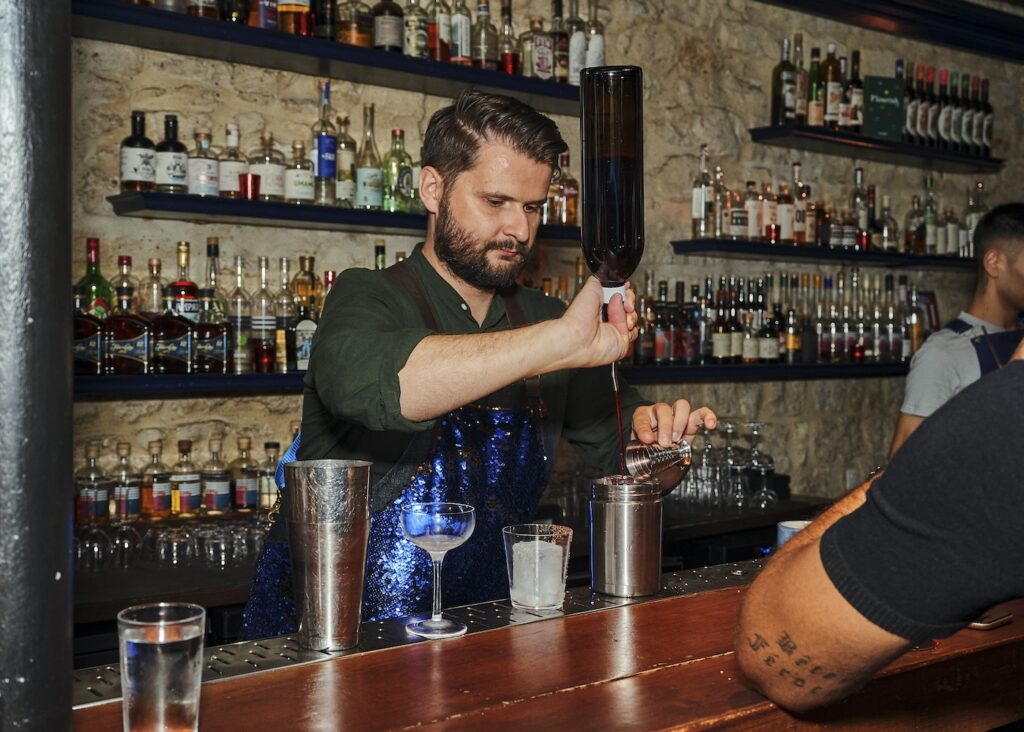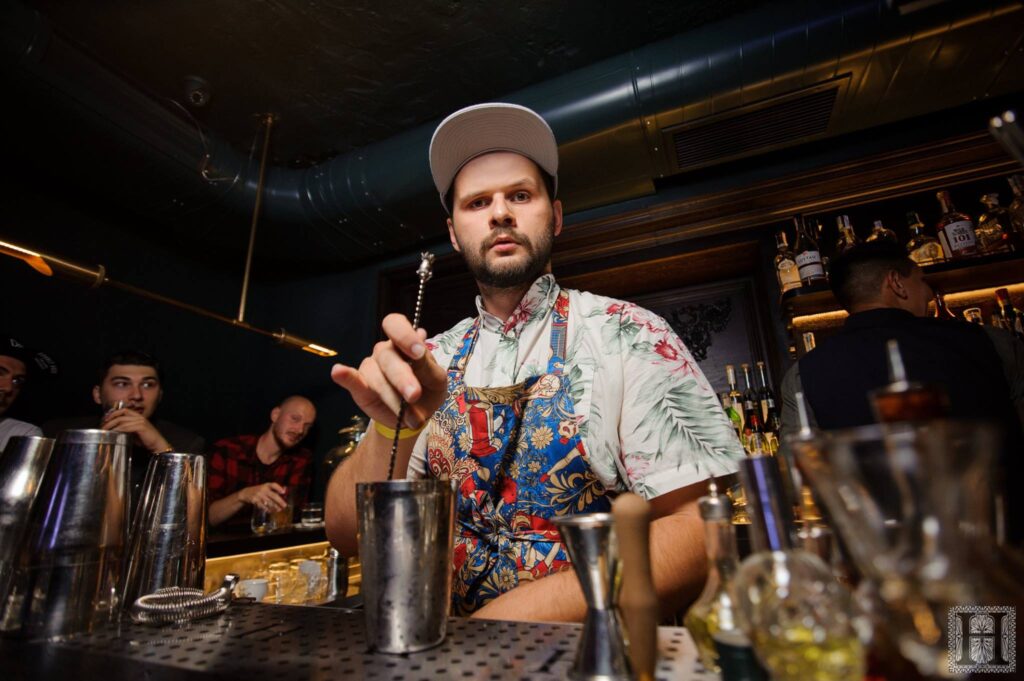Dan Nevsky is a name synonymous with innovation in the world of bartending. With a journey that spans multiple countries and cultures, Dan has not only mastered the craft but also redefined what it means to be a modern bartender. From his early days behind the bar in Scotland to his role in Amsterdam’s cocktail scene, and now as a globe-trotting industry leader, Dan’s story is one of creativity, perseverance, and a relentless pursuit of excellence.
Can you start by sharing your bartending story?
I began working in the hospitality industry at the age of fifteen. I started as a waiter, then moved up to being a barback, and by the time I was eighteen, I was behind the bar. Back then, there was a strong wave of Scottish bartenders making a name for themselves in London, becoming big stars. I was lucky to learn from these global icons, although I consider myself part of the local generation.
Are you also part of the social media generation?
Yes, but since I come from a background where I was aware of the world beyond Britain before social media arrived, I had a different perspective. London was seen as the cocktail capital of the world, but I never found it as enchanting as others did. I lived in London from ages eight to fifteen, and even as a child, I didn’t quite like it. When I returned for competitions, the snobbish attitude of some Londoners really got on my nerves.
Before we dive into your return to London, tell us about your time in Scotland. Where did you work?
This was between 2008 and 2012. I worked in nightclubs and busy pubs before competing in my first cocktail competition. Those early days were wild. I lived in Aberdeen, the third-largest city in Scotland, but we had significant supply issues. I remember wanting Gosling’s Rum, which was available in England but not in Scotland. My supplier ended up ordering it from Bermuda, and I was shocked, thinking, “We’re just three hours from Manchester where it’s locally distributed!”

Did you face these challenges in London?
Not exactly, but other challenges arose. I often criticized London because I felt that more exciting things were happening elsewhere in the world. As a result, I didn’t have many friends there. Plus, I wasn’t aware of the city’s bar institutions, so I’d visit a legendary bar, have a drink, and think, “Well, this is decent.” But in a way, it was great that I didn’t know the history—it allowed me to be objective.
Then came Amsterdam?
Yes, in 2013, I landed a job at Tales and Spirits Bar and was part of the team that opened the bar. No one there knew me, so I started from scratch. That’s when I realized how interconnected the bartending community is across Europe, with bartenders and bars knowing and recommending each other.
The bartending world sees you as someone who excels with social media. What sets you apart?
Maybe I should go further into my story to explain what it’s all based on. When I left Tales and Spirits in 2016, everyone thought I was crazy. We were on the World’s 50 Best Bars list, and it was a great job. But I felt that my creative contributions to the bar’s menu weren’t being appreciated. One night, I found myself searching Wikipedia for new ideas for a Mexican menu, and I thought, “What am I doing? I should be experiencing Mexico in person, not researching it online.” Have you seen the movie Good Will Hunting?
Of course.
There’s a scene where Robin Williams tells Matt Damon’s character, “You’re a genius, and you know everything. But if I asked you about the Sistine Chapel, you could tell me how old it is, how many windows it has, but you wouldn’t be able to tell me how it smells.” That scene really struck a chord with me.
What did you do next?
I decided that I wanted to be the best in the world. After all, what bartender doesn’t want to be the best? Competition drives innovation. But how could I be the best? I had never won an international competition, never worked in a top bar in London or New York—I was just tucked away in Amsterdam. So, I thought about what hadn’t been done before. I realized no one had been a full-time, globe-trotting bartender. I had about 15,000 euros saved up, so I spent it all on a massive project—12 months in 12 bars around the world. No one really noticed the project, but I knew I was gaining experiences that no one else had.

How did you use those experiences?
I started collaborating with Eddie Rudzinskas on the Cocktails for You project—not as an employee, but as a partner. I knew we could help each other, and suddenly I had access to tens of thousands of followers and started working with social media in a way others hadn’t. But all of this was possible because I had completed that year-long project, during which I slept on couches in various dives and even had my appendix burst on a plane. And during that project, I achieved what I set out to do—I became a better bartender. Experience doesn’t have the same value for everyone.
What do you mean by that?
A few years ago, I got into an argument with a bartender who eventually shut me down by saying he had been a bartender for sixteen years and had more experience, so he was right. I responded that using that argument meant he had already lost. He had worked those sixteen years in three places—a cruise ship, a pub, and a hotel in a small town.
You’re originally from London, started working in Scotland, moved to Amsterdam, traveled the world, and now you’re settled in Barcelona. Is Barcelona the best place for you?
Definitely. I don’t stay anywhere where I don’t feel good, and I strongly recommend that to everyone. I also suggest trying something else—cancel all your commitments, including your lease, keep only your phone and some savings, and become a homeless globetrotter. You’ll feel lonely and lost, but also very free. It will change your perspective on the world because you’ll experience discomfort. And two things will happen—you’ll learn what you don’t like, so you’ll understand yourself better, and you’ll be better equipped to handle complex situations. But back to Barcelona. Is it a beautiful place? Absolutely! Do bartenders get paid well here? Definitely not! But I’m drawn to the quality of life here and the vibrant energy, which I love.
You have a lot to compare it to—I’ve heard you’ve bartended in Kazakhstan as well. I wouldn’t have thought to go there for a gastronomic experience. Is there a place you haven’t visited yet but would like to?
I’m very intrigued by South America, which I haven’t explored much yet. We tend to view the cocktail world as an Anglo-Saxon domain, but that’s far from the truth. You’ve heard of Jerry Thomas, right?
Yes.
Did you know there’s a Spanish Jerry Thomas? While the American Jerry Thomas has 50,000 Google results, the Spanish one has 200,000. He wrote many more books, but we know very little about him because he’s from a non-English-speaking world. Schumann is the German Jerry Thomas. Our industry is far more interesting than it seems. We’ve just yet to discover most of it. A friend of mine once gave a lecture to 250 bartenders in Iran about mocktails, since they can’t work with alcohol there. Isn’t that amazing? The world is diverse and exciting, and a good bar in Asia might not be considered good in Europe, and vice versa. I’m glad to be alive right now when we have so much to explore.

What are your thoughts on the current situation and changes in the business?
The system was set up so that guest bartending for two hours could earn you 2,000 euros. Some bars completely gave in to brands. The pandemic might change all that, with more focus on real values. When I offer my services, I want to bring my whole portfolio—I add staff training and social media content creation, including videos, to a six-hour guest shift. I want the other party to know they’re paying for value. Bars and brands will change their strategies. There’s still money in the business, people are still drinking, but the money will be distributed differently.
Do you think global brand ambassadors will disappear?
Some might, but other brands will take advantage, filling those positions, and eventually, the original ambassadors might return. Either way, they’ll have to work harder, develop new skills, work with video, and communicate in modern ways. Some companies might realize they only need local ambassadors who know the market best. Global ambassadors will remain for those brands without the budget for multiple local ones. Or it might become an honorary title—like a well-deserved retirement.
What does the online world mean to you?
Today, it’s not just about communication or seeing what’s happening elsewhere in the world. It’s also a way to protect yourself from infection. But I must say, the bar community is in the Stone Age when it comes to online presence. We’ve been outpaced by the music, fashion, and even pharmaceutical industries! Many bartenders see it as just showing off, but that’s not true. You need to engage differently—bring value, or at least an authentic perspective. It’s not just about posting pretty pictures of cocktails; it’s about storytelling, education, and connecting with your audience in a meaningful way.
Do you have any advice for bartenders who want to improve their social media presence?
Absolutely. First, be yourself—authenticity is key. Don’t try to copy what others are doing; find your unique voice and stick to it. Second, focus on creating content that offers value to your audience. Whether it’s a new cocktail recipe, a behind-the-scenes look at your bar, or tips on improving bartending skills, make sure your posts serve a purpose. Third, engage with your followers. Social media is a two-way street; it’s not just about broadcasting your message but also about listening and responding to your audience. Finally, don’t be afraid to experiment and have fun with it. Social media is an extension of your personality and brand, so let that shine through.
Looking back on your journey, what are you most proud of?
I’m proud of the risks I’ve taken and the path I’ve carved out for myself. It hasn’t always been easy, but I’ve stayed true to my passion and followed my instincts. I’ve had the opportunity to work in some incredible places, meet amazing people, and learn from different cultures. But more than anything, I’m proud of the connections I’ve made along the way—whether with fellow bartenders, mentors, or the patrons I’ve served. Those relationships are the most valuable part of this journey.
What’s next for you?
I’m always looking for the next challenge, the next project that will push me out of my comfort zone. I’m excited about exploring new markets and continuing to grow my brand. I also want to focus more on mentoring the next generation of bartenders. I’ve learned a lot over the years, and I think it’s important to pass that knowledge on to others. And of course, I’m always looking for new ways to innovate and stay ahead of the curve. The world of bartending is constantly evolving, and I want to be at the forefront of that evolution.
Any final thoughts?
I’d just like to say that bartending is more than just a job—it’s a craft, an art form, and a way of life. It’s about creativity, hospitality, and making people feel special. Whether you’re mixing drinks in a bustling city bar or creating cocktails in a remote location, remember that you’re part of something bigger. Embrace the journey, take risks, and never stop learning. The possibilities are endless, and the world is full of opportunities for those who are willing to seize them.



